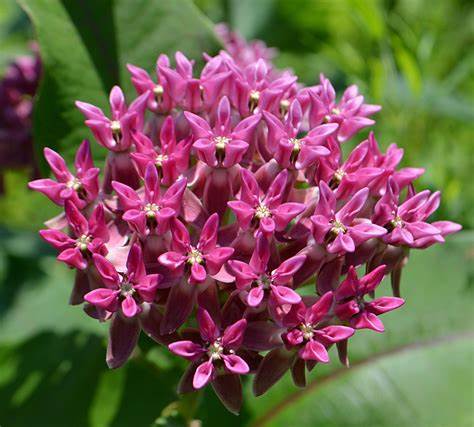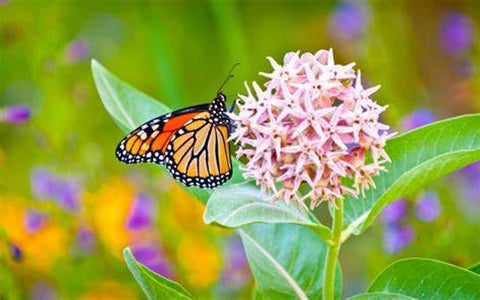

Milkweed - Asclepias
Scientifically known as Asclepias, milkweed plants are a marvel of nature, boasting a distinctive beauty and a host of ecological benefits. These herbaceous perennials typically grow in various habitats, from meadows and fields to roadsides and gardens, adorned with clusters of delicate, intricate flowers in shades of pink, orange, purple, and white. Their slender stems reach towards the sky, crowned with broad, lance-shaped leaves that often exhibit a milky sap when broken, lending the plant its name.
While the aesthetic appeal of milkweed is undeniable, its true importance lies in its crucial role in supporting various forms of wildlife, especially monarch butterflies. These captivating creatures rely solely on milkweed as their larval food source, laying their eggs on the undersides of its leaves. Once hatched, the monarch caterpillars voraciously consume the foliage, assimilating the plant's toxins called cardiac glycosides into their bodies, which makes them unappetizing and toxic to predators.
Milkweed plants are essential for monarch butterflies.
Beyond serving as a vital nursery for monarch caterpillars, milkweed sustains many other pollinators, including bees, butterflies, and hummingbirds, with its abundant nectar-rich blooms. Furthermore, milkweed is crucial in maintaining and providing habitat and food sources for various insects and birds throughout its life cycle.
Where to buy Milkweed plants?
Nance Plants offer milkweed plants for sale online.
In essence, milkweed plants are unsung heroes of the natural world. They embody the delicate balance of ecosystems and showcase the interconnectedness of all living organisms. Through their symbiotic relationship with monarch butterflies and myriad other creatures, milkweed plants exemplify the profound beauty and functionality of nature's intricate tapestry.
Color:
Pink
Ships:
Year round
Ships As:
Bare root
Season:
Summer
Height:
3-5 ft
Zone:
3-9
Exposure:
Full Sun
Category:
Perennials, Pollonators
Deer Resistant:
Yes
Native:
Yes




